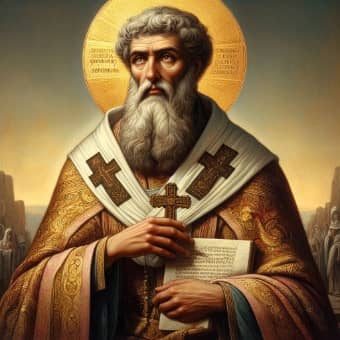Saint Theodore of Tarsus
A Beacon of Faith and Wisdom
Saint Theodore of Tarsus, also known as Theodore of Canterbury, was a remarkable figure whose life and teachings continue to inspire us today. Born in Tarsus, Cilicia (modern-day Turkey) around the 7th century, Saint Theodore’s legacy is one of unwavering faith, intellectual brilliance, and dedicated service to God and His people.
Early Life and Education
At a young age, Theodore displayed exceptional intellect and a thirst for knowledge. Recognizing his potential, his parents arranged for him to receive a comprehensive education.
Under the guidance of renowned scholars, Theodore delved into various fields of study, including philosophy, theology, and law. His profound understanding of these subjects laid a solid foundation for his future endeavors.
This blog post contains affiliate links. When you click on a link on this page and make a purchase I may earn a small commission, at no additional cost to you. Thank you for your support.
Archbishop of Canterbury
In 668 AD, Theodore was appointed as the Archbishop of Canterbury, a position that would define his life’s work. With great zeal and determination, he embarked on a mission to unify the English church and establish a stronger spiritual foundation throughout the region.
Saint Theodore’s leadership was characterized by his emphasis on knowledge and learning, promoting the study of Latin and Greek, and encouraging the clergy to deepen their theological understanding.

Synod of Whitby
One of the most significant events in Saint Theodore’s tenure as archbishop was the Synod of Whitby in 664 AD. This gathering aimed to resolve the differences between the Celtic and Roman Christian traditions in England.
Through his wisdom and diplomatic skills, Saint Theodore successfully mediated the disputes, ultimately leading to the adoption of the Roman practices and the unification of the English church.
Legacy and Influence
Saint Theodore’s impact on the church and society extended far beyond his time. His dedication to promoting education reverberated through the centuries, shaping the development of scholarship and laying the groundwork for future intellectual movements.
His commitment to unity in the church also set an important precedent for future ecumenical dialogue and cooperation.
Conclusion
Saint Theodore of Tarsus remains an icon of spiritual leadership, intellectual pursuit, and compassionate service. His contributions to theology, education, and church unity are undeniable, and his teachings continue to guide and inspire countless individuals today.
As we reflect on his life, let us strive to emulate his unwavering faith and tireless commitment to the betterment of God’s creation.
Saint Theodore of Tarsus, pray for us.
